Samantha Cooper and Michelle Groskopf
Samantha Cooper is the senior photo editor, platforms at WIRED. Previously she was a photo and video curator at Instagram, a creative producer at Airbnb, and a photography instructor at the Harvey Milk Photo Center in San Francisco, CA. She studied film and video at the University of California at Santa Cruz and currently resides in Oakland, California with her wife and their dog, Peanut.
Michelle Groskopf is a Los Angeles based photographer. Her street photography has been celebrated in The New Yorker, The British Journal of Photogrophy, The Huffington Post, Booooooooom, The Phoblographer, It’s Nice That, Aint-Bad, Lenscratch and more. Her editorial and commercial client list includes Wired Magazine, Bloomberg Businessweek, New York Magazine, Apple, Square, GQ, Refinery29, Shopify, and more. She is a 2019 PDN 30 and a recent recipient of an AP 34. When she isn’t on assignment she teaches under privileged youth in LA thanks to programs such as Educare, Youth Arts and the Lucie Foundation.
Samantha Cooper photographed by Caroline Tompkins
Michelle Groskopf photographed by Maggie Shannon
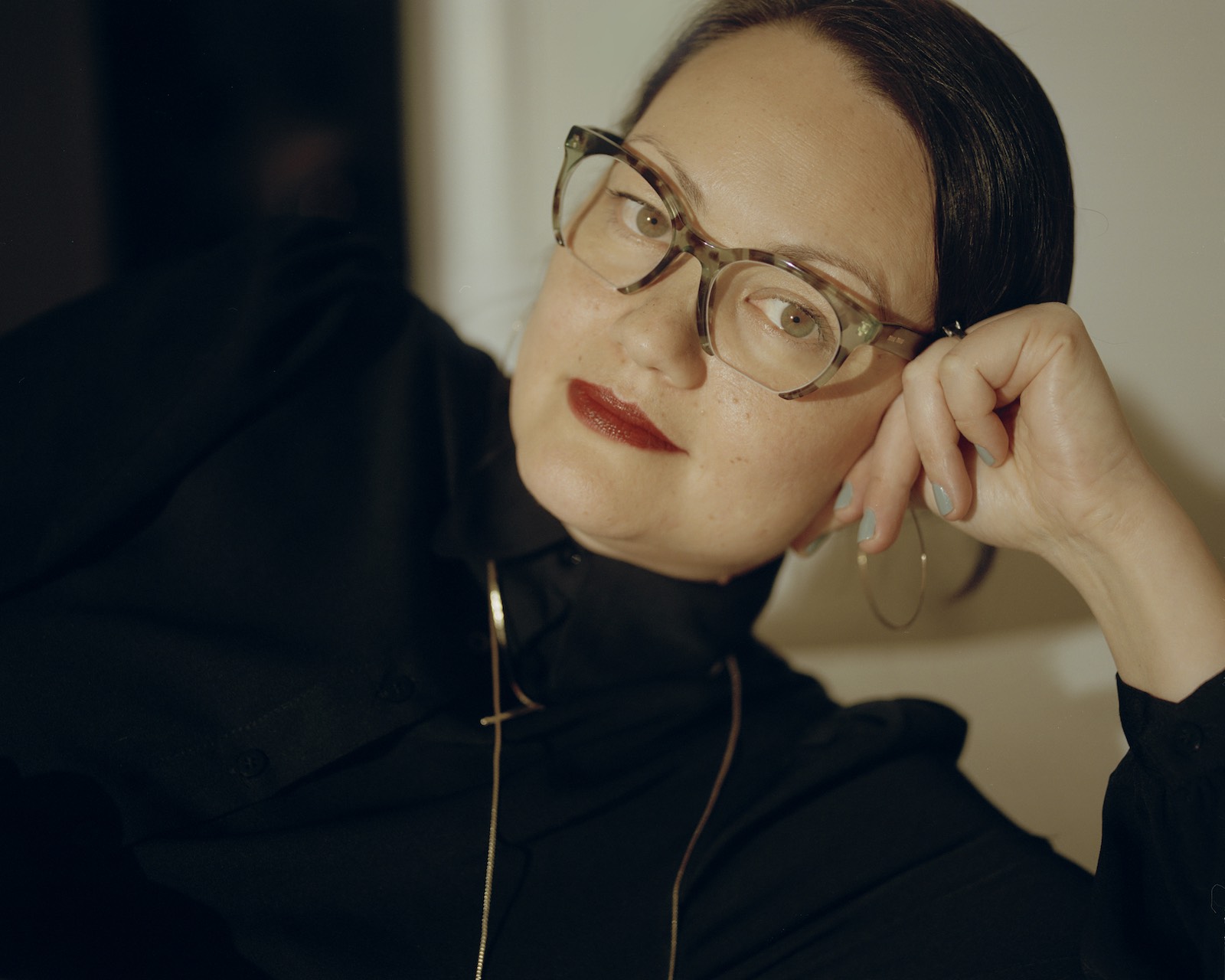
Samantha Cooper
Samantha Cooper: So, last time I saw you, we were in LA, with our wives and our barking dogs… What have you been up to since then?
Michelle Groskopf: Let’s see… More work, I want to say. Some various shoots. I’ve got some new clients rolling in… I’m trying to remember exactly what’s happened since I’ve seen you last but definitely some more shooting, which is nice. I invested in some Profoto lighting. Oh, I got PDN 30!
SC: This was awesome! I saw that and I was so happy.
MG: I was nominated before and I never got it but to get it felt like the cherry on top of a really really good run of ten months. This year’s been really, really good.
SC: That must have felt so good.
MG: Also, I got engaged, which is the most important thing.
SC: Yes! That’s a big thing.
MG: The biggest. And it feels like a natural step, Sasha and I already felt like we were married. I’m not big on marriage but I couldn’t do anything without her and her support, and we’re such a big part of each other’s lives. We lift each other up and it’s so positive and we’re just living our lives with our dogs and it just seems such a normal next step, but she surprised me with the engagement.
SC: Ha, that’s awesome. Next time we’re together, we have to celebrate all of this.
MG: Yes! I don’t spend enough time celebrating. I need to celebrate more. How about you? Everything good?
SC: Yes! Actually just now, right before we started this call, I heard four WIRED photographs from 2018 were selected as American Photography winners. I produced the Boots Riley shoot, with images by Oriana Koren, and just found out one of the images from that shoot was selected.
MG: Yes!
SC: I know I shouldn’t care about winning awards, but not gonna lie, it feels good and provides a sense of validation.
MG: It’s really important, I think, to feel supported, and to feel part of the community. And feeling the recognition, after all the hard work, and taking some risks… Having a group of people that you admire and respect tell you “you did this, we see it”, is really powerful.
“It got to a point where I really desperately needed a change”
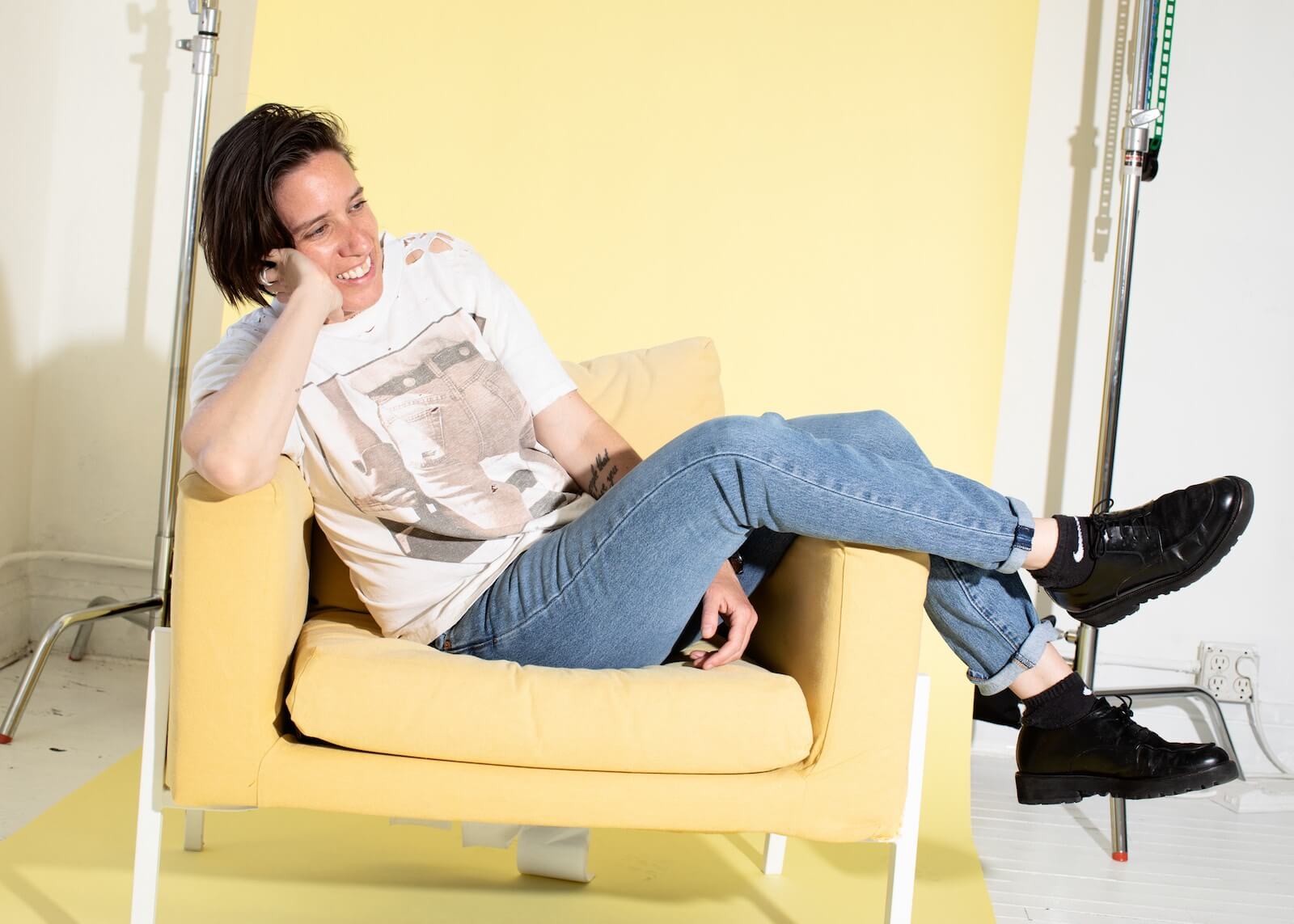
Michelle Groskopf
SC: We’ve worked on a couple of projects together, and I feel we became good buds but I realized I don’t know that much about how you started. And I’m really curious, how did you get started?
MG: I actually started when I was about 15. Photography’s come to save my life twice. The first time was when I was a very, very awkward young person and I felt like I didn’t belong anywhere. I was skipping class a lot – not to do anything cool, or do drugs or anything like that, but to read by my locker. I was a bit of a loner and somehow, I found this art teacher and this writing teacher and both of them took a shine to me and saw some kind of potential in me. They believed in me and pushed me and put all these tools in my hands to express myself in a way that nobody had ever done before in my life up until that point. And at the same time I started doing music, I bought a drum kit. I still have an electronic drum kit in my house now. And I got my first camera, and I began to take photos obsessively. I would go into the suburbs, or downtown and just wander around. I remember particularly being in love with these old laundromats and barbershops and taking photos. So photography and filmmaking really saved me. Then I lived in New York City for a large chunk of my youth. I studied filmmaking and ended up being a media producer and teaching film in the graduate dept. at School of Visual Arts. Being a producer was far from what I wanted for myself and my life wasn’t very creative. I felt blocked and trapped. I got to a point where I really desperately needed a change. So I moved to Los Angeles but I still didn’t really consider photography as a career option. I still thought about producing and I tried to get work but I couldn’t find any and I was in a really bad place emotionally and eventually financially. I ended up working at a coffee shop. It felt like I had left my life in New York City and all the security of my job and friends to try something new and it was failing. It was devastating. And so, just to give myself some kind of outlet, I picked up a camera because I didn’t need a crew and I didn’t need other people and I didn’t need money. I had everything I needed. I just had to walk my dog and take photos. And I started doing that – I did that every day pretty much for a year straight. And it kind of coincided with getting work and getting better and then suddenly my work was getting some attention and some blogs picked it up and then I got an agent and I started shooting for Vice and stuff like that. It was all about taking time for myself and doing photography while trying to get back to a good place. So photography changed my life, 100%, again, for the second time.
SC: That’s awesome. I actually had a mildly similar situation when I picked up photography because I studied film and video in college and when I moved to San Francisco, I enrolled in a still photography class. Back then everything was taught in the darkroom. There were no digital photography classes. But I loved the simplicity of being able to shoot without a crew. I loved being able to just pick up the camera and go. Fun fact: I actually failed my first photography class. Who does that? But yes, I failed beginning photo, which says a lot about me at that time. I loved being in the darkroom so much I stopped going to class and spent all of my time shooting then developing film and printing in the darkroom. Of course later on this would haunt me when I needed my transcripts, but I was pretty young and stupid at that time.
MG: Well, an arts education can be overrated sometimes.
SC: It’s interesting to think about beginnings because if I’m tracing back to the absolute beginning, for me it started when I was working in a hospital as a candy striper when I was super young. I don’t even know if people still use that term anymore, do candy stripers still exist? I had to wear that stupid dress.
MG: Wow.
SC: They gave me two options. They said I could either take a food cart and go around to all the rooms and give people juice and crackers, or I could go into the lab and make copies of all the X-rays. And that was when all of the x-rays were still film. So I would make copies of lots of broken bones. That was probably my very first introduction to film.
MG: Very cool. Well, before my mom was a hearing specialist, she was a radiologist. And she left it because she used to work at a children’s hospital and it was too hard, emotionally. But your story’s too funny.
SC: I love to look at X-rays.
MG: Yes! My mom would bring some home and we would be amazed by them.
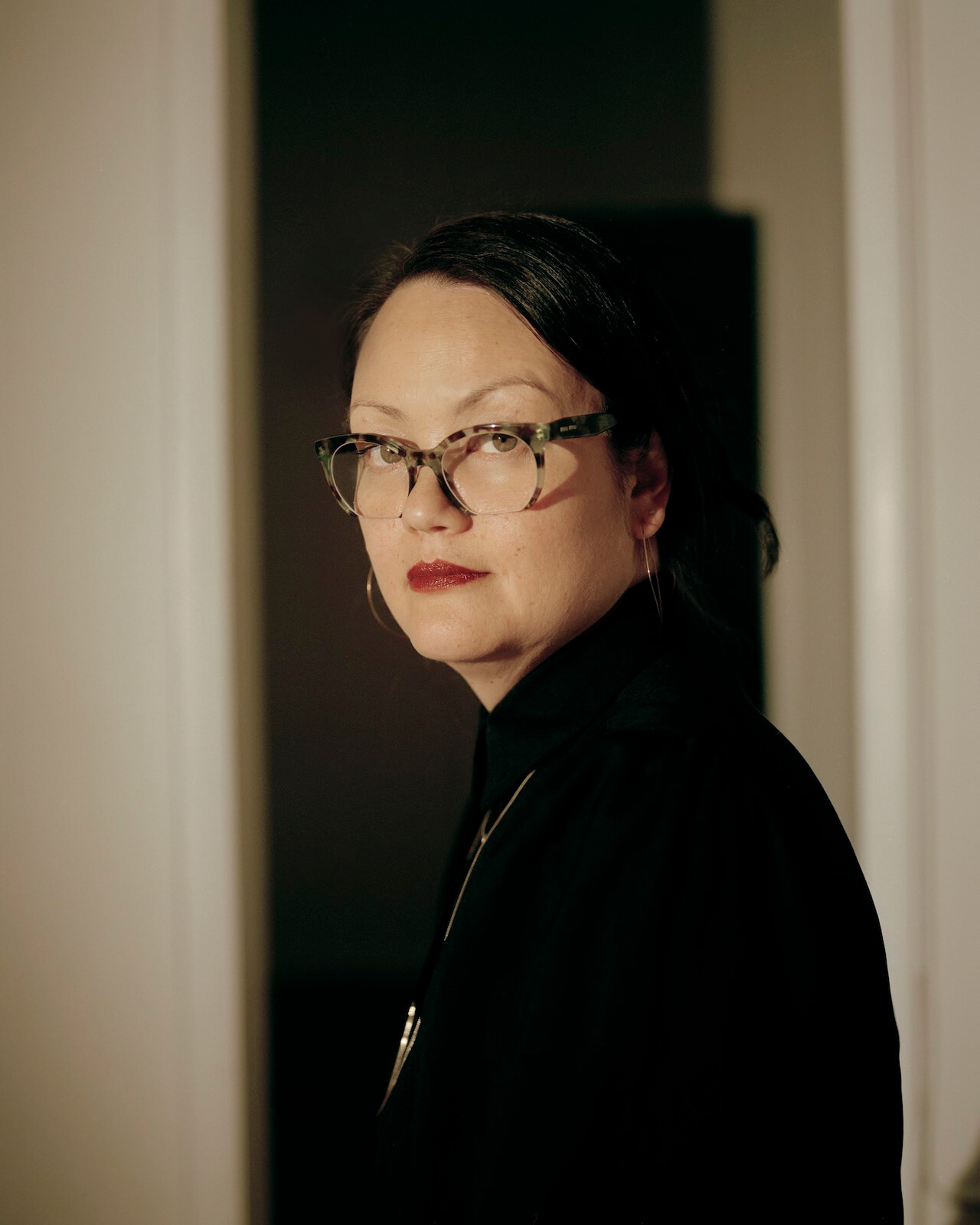
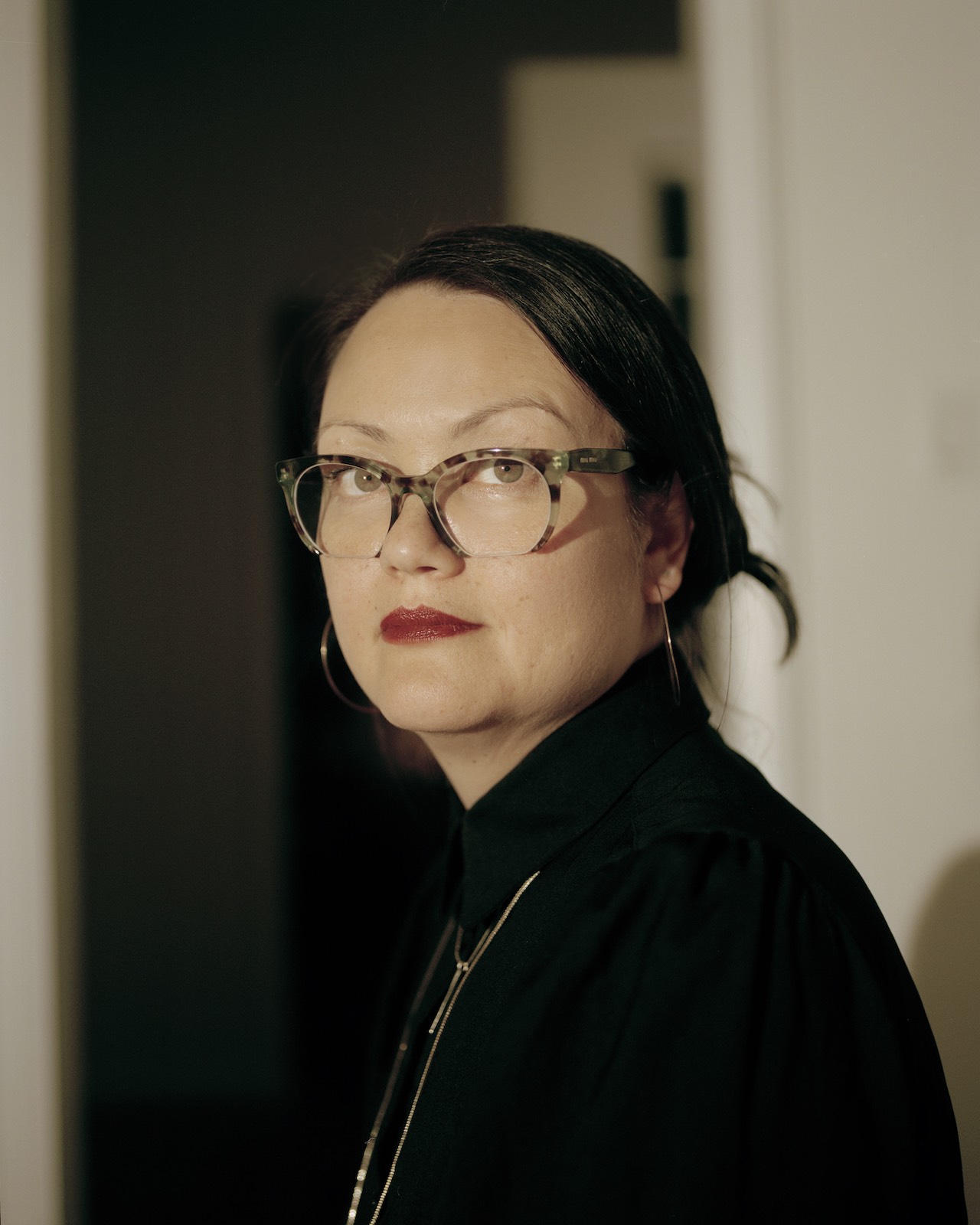
“Am I loaded? No, but I can finally take care of myself doing the things that I love.”
MG: I thought I was going to be a filmmaker, 100%, when I was young. And I had a great experience at school, I really loved it. It’s just unfortunate how difficult it is to make films. It’s crazy. Even something tiny takes so much money now and so many people. I graduated with honours and I really thought, “I’m going to be a filmmaker!” My first job out of the gate was being an associate producer at A & E Network. I thought it was very special. I got seduced by the opportunity to make some money and to have a job that sounded great as opposed to taking a risk and pursuing filmmaking. Then I got all wrapped up in producing for the next ten years making all kinds of stuff from smaller media productions to developing science programming for television. It’s really interesting how so much of my life in NY was pushed or driven by money. New York’s a hustle. I often wonder, had I left New York City for LA earlier, like right after I had finished school, if I would be making films now instead. And I was always concerned about paying my rent and having a good job that I was proud of. You know, saving some cash and stuff like that. And then coming to LA to lose all of that and then to completely reposition myself and my career in a way that was much less stressful. Although it’s still very stressful in a way but it’s much more enjoyable for sure and much more free.
SC: How long have you been in LA, now?
MG: Seven years. I just passed my seven year anniversary. And it went by so fast. I remember slogging through 15 years in NY but the years here are just blowing by so quickly and I feel very free and very open and my ideas about what I should be doing with my life and what my goals are have completely changed. It has freed me up to be more successful and more true to myself. I really feel that my photography career has been expanding from a very organic place. My art practice is my most important practice and that has nothing to do with money, which is a great feeling. And that’s true freedom for me. I make work for myself. I can do it any time, I just walk out my door and I shoot. If not everyday, almost everyday. Making my this very personal work has led to being able to work with magazines I’ve respected my whole life. It’s all developed very organically. I’m in a place right now where I feel really happy. Am I loaded? No, but I can finally take care of myself doing the things that I love. And it’s just a very freeing place to be.
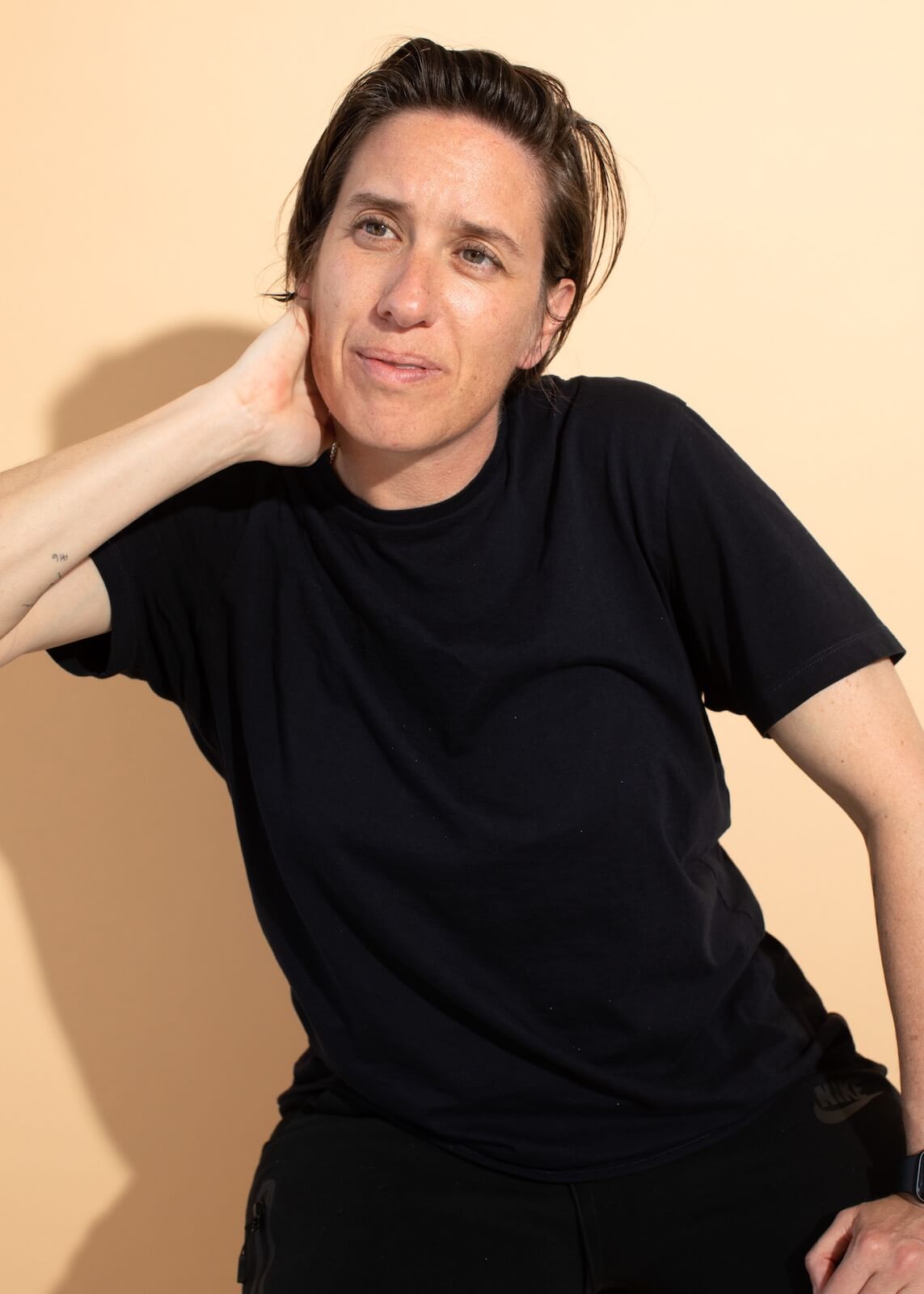
SC: I see this in a lot of portfolios where I wish more photographers were creating and sharing more work for themselves. I mean, you see a lot of commissioned work, but I’m more interested in knowing what you’re shooting when you’re not on assignment.
MG: Well, when I get an assignment, I want to bring my own ideas to the table and use my style which is probably why I got hired in the first place but I also have to consider the audience and the story I’m telling. A big part of that is simply about doing a good job. I like doing a good job. I want to give the editor what they need. It’s a big responsibility when you get put on a story, even if it’s just a silly fun story. You still want to replicate or give a window into this world in a way that’s evolved or interesting. So, it’s a lot of pressure. Whereas with shooting in the street, I get to be my wacky self. I just shoot all the details and all the weird things that I’m just wandering around looking at. I’m not considering what people think about it or Instagram or anything, I just get to make it for me. It’s such a pleasure. I hope nobody ever takes that away from me.
SC: It shows in your work. Your whole process is kind of crazy to me. After seeing you work on a commission and then also observing you when we hung out after – you not only get close but you get so close and you flash right in people’s faces. Sometimes I worry about you! I mean, I wish I was like that with my own photography. I’m very timid when I shoot. I seek permission to be in people’s space which often means losing a shot, and a lot of natural authenticity. If I’m shooting on the street, I usually shoot from really far away and it’s more for me about observing a person’s place within their environment, but it’s really very distant, so I admire how fearless you are, and how close you get in your work. Also when I see you shoot, and then I see the resulting images you share on Instagram, I’m thinking “wow, that’s totally different from what I thought you were trying to capture.
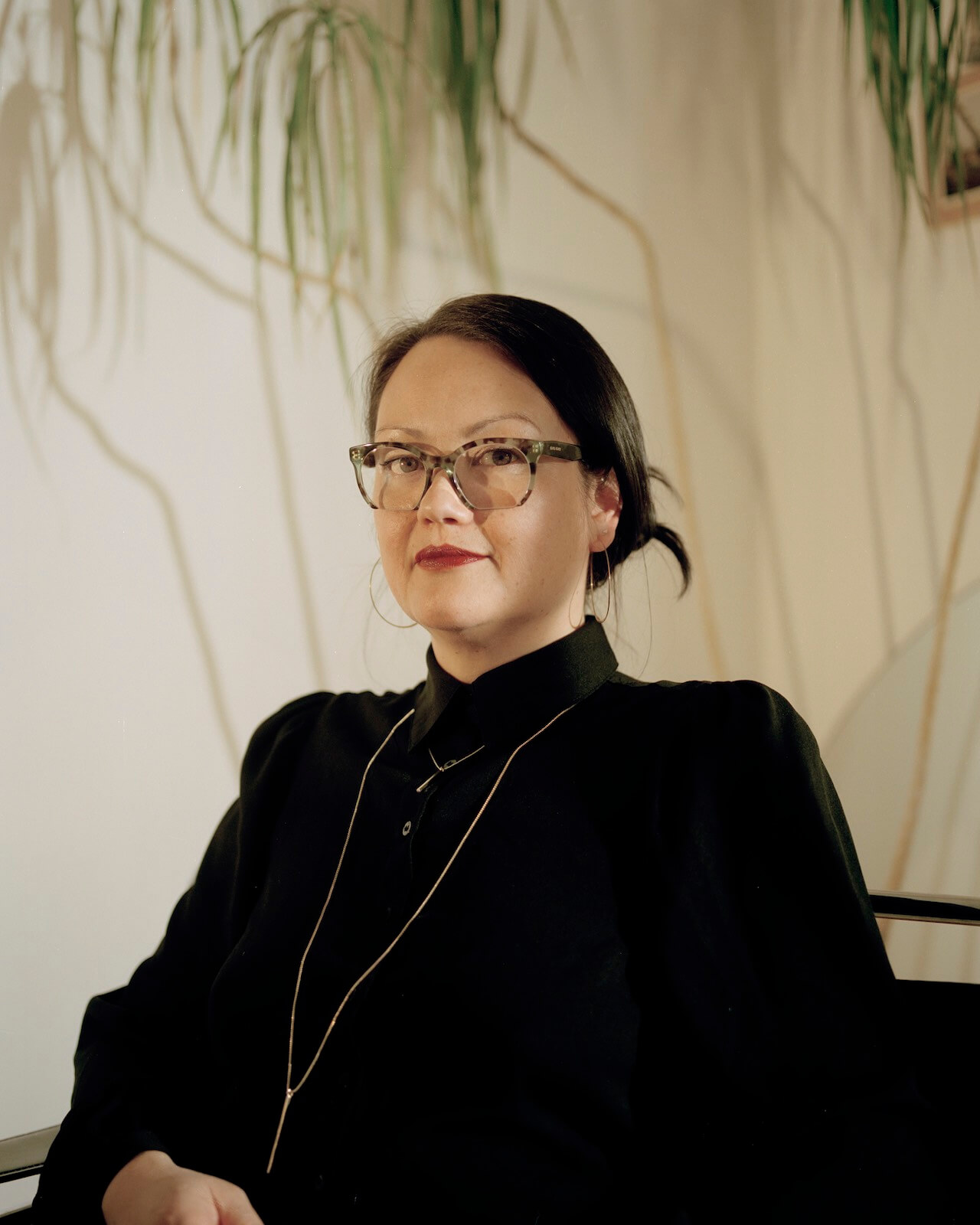
MG: You know, the other day, I was on Hollywood Boulevard shooting and I shot these two young men and they seemed like kind of artsy, they looked like they could have been in a band. They just looked fantastic and they were sitting on skateboards against the wall. They had nail polish on and they were about 19 or 20 years old. Just perfect subjects for me, you know. And they were just doing their thing and I went up and I took a photo of them and without even a blink of an eye, one of them stood up and rushed at me, threatening me. I was so scared. And he had his fist way up in my face and said “what are you doing? You can’t take my fucking photo!” And he was enraged. He was tall but not very big, but I really thought I would have to whack him with my flash, it was very scary. And it’s just so depressing that he would rush to violence so quickly without even saying “hey, what are you doing” or “please, don’t do that”. It was just very physical, very quick. So, sometimes stuff like that happens and it shakes me up for a few days but for the most part, I think people want to be seen and I think they feel that I’m coming at them with good intentions. And it’s kind of obnoxious what I do but I don’t know if I would ever stop it. I mean, I’ve had some pretty scary situations but I just keep going. It’s like an impulse and even if I’m missing out on a few shots, I still see them, I can’t stop seeing things. I don’t carry a camera with me everywhere either. I feel that the act of seeing is important so whether you take the shot or not is not that big of a deal, it’s all about recognizing what you’re looking at. That’s the most important part of the process, getting to know yourself, what you’re looking at, what excites you, what makes you pivot, what makes your neck turn. It’s almost like you don’t even need the camera. So I wouldn’t worry so much about missing a few photos here and there.
SC: I mean, what you do is pretty crazy and amazing.
MG: Thank you. I love street photography so much. It’s so meaningful to me. It’s also such a pleasure getting an assignment for something that’s really interesting to me and getting the access and permission to shoot it. Knowing I’m allowed to be somewhere and free to shoot without being yelled at or questioned. That is a very freeing and special feeling. I don’t get that with street photography.
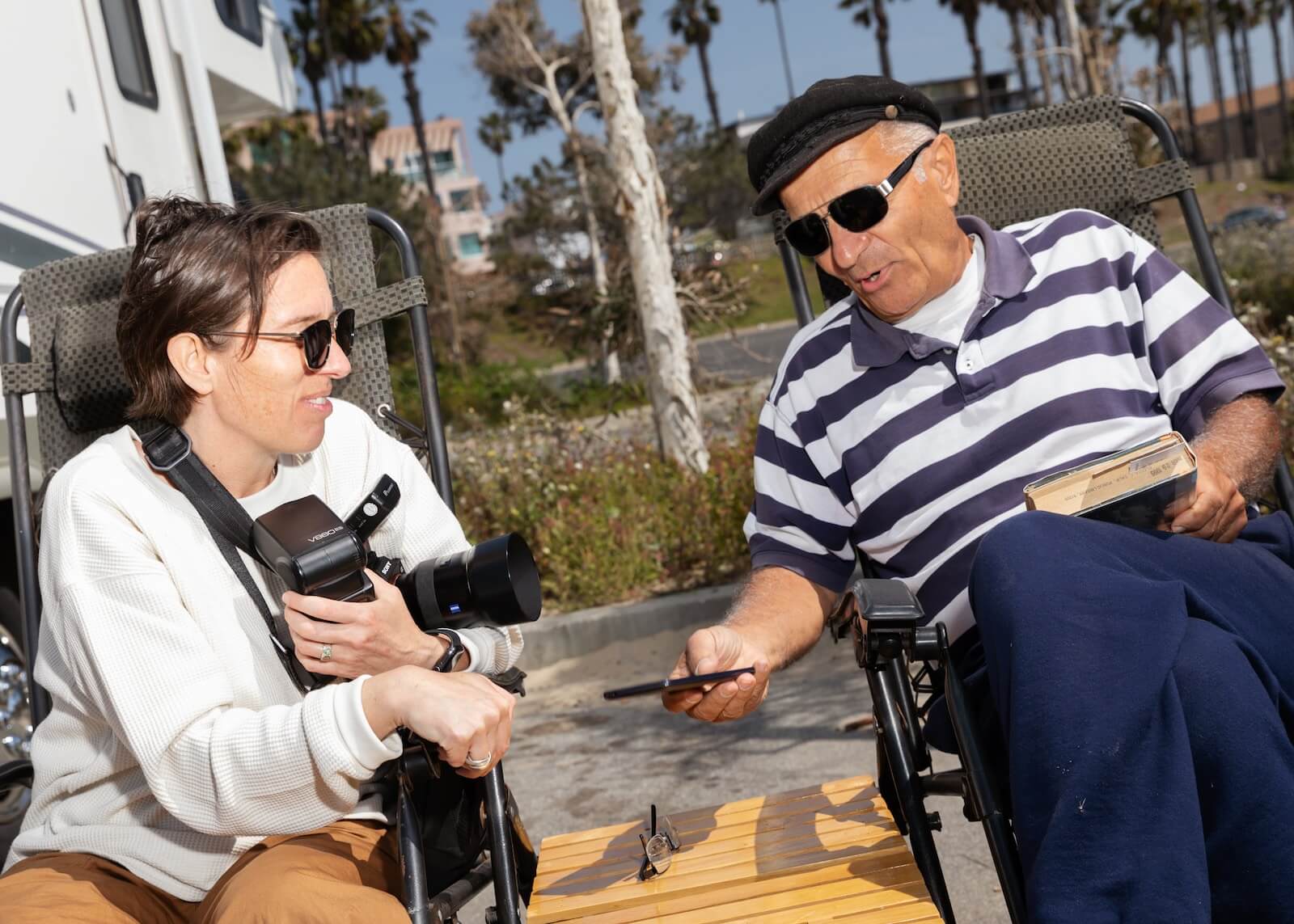
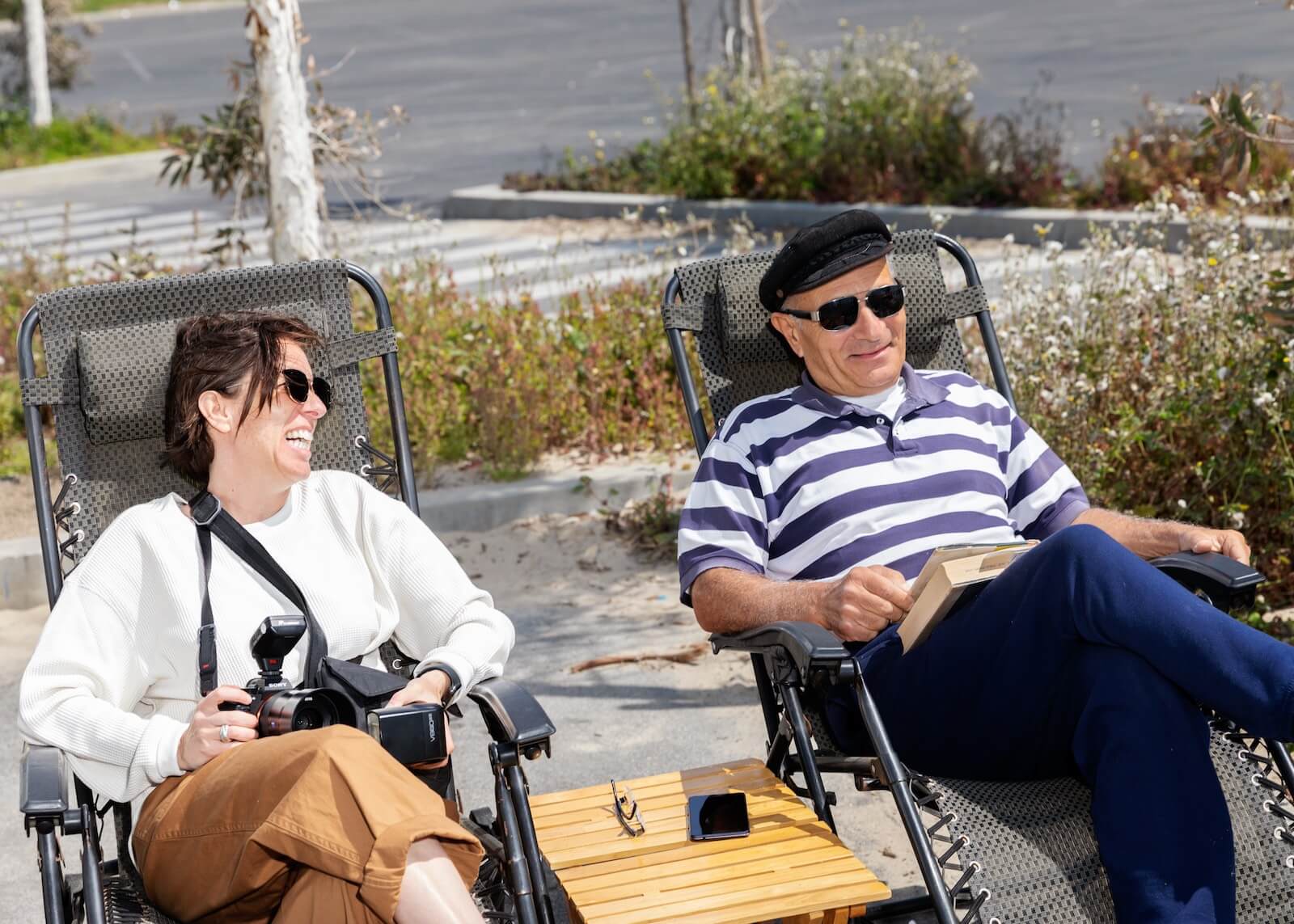
SC: It makes me think about when Anna commissioned you for Wired 25, and some of the people we were covering were pretty big names, and they were probably expecting this giant set up and you just came in and did everything in 15 minutes. And I think they were quite taken aback by how quick and simple your setup was.
MG: Well, I appreciate big studio shoots. But I just don’t understand them. It takes so little to get something really real. Of course I have a very specific style that’s a bit raw and rough. And that’s probably because I’m only using a single light and I’m in and out pretty quickly but I think you can accomplish so much with very little. I don’t need an assistant or a stylist. I just need to have a good eye and rely on my sensibility. Anything on top of that is just cherries. Sometimes the industry feels really bloated to me. I get that everything costs money, and people want to make sure things look good. Maybe they get nervous. I get all of that. But there’s something that’s killed in that atmosphere. It’s just nice to be raw for a second, to be crazy and it shows in the photos, the energy’s different. That’s why I’m always searching for that energy even with something that is still. And when I get to do that on assignments, it’s extra nice. And working for you and your team is the best. The best, the best, the best.
SC: With everything going really well for you is there anything that you’re worried about or frustrated with in the photo world?
MG: Oh yes sure. Everyday, I feel like it’s going to go away! (laughs) I worry that I might stop getting calls. That people might get bored of my style. All the normal nightmares. I really, really like where I’m at in my life. It seems like such a gift, such a dream. If it suddenly all went away, I would be heartbroken. Unless they change the rules for street photography – and if they did, I’d probably still try and break laws occasionally. I feel like I’ll always have street photography, nobody can take that away from me. But this new pleasure of getting paid to do what I love and tell stories and meet all these interesting people is an amazing feeling. I try to be in good shape. I’ve been really into weightlifting for the last few years because I know how hard photography is physically so I want to make sure I can hold on to my light, that I can carry my crazy heavy camera bag and travel and not feel that somebody has to help me.
SC: Yeah, I think about that a lot. How physical it is. The other day, I was lugging around two camera bodies which was fine for a bit but at the end of the day, I was feeling worn out. And I kept thinking about photographers I’ve worked with who do this all the time, all day, every day – for multiple days for 8, 10, 12 hours. It’s impressive.
MG: Yes. Mentally and physically, you have to be in it, keep the energy flowing. But I think the more you do it, the stronger you get physically and your body is able to adapt. Though I also think that when you’re really happy doing what you want, time flies. Sometimes I get so focused that I don’t even know what’s going on. I’ll forget to eat. I’ve actually started to pack a bottle of water in my camera bag so I’ll remember to pause and drink some at some point. But you just get so wrapped up in it and you don’t want to miss a single moment so you just do it and then it’s over, and you can crash a bit before you edit.
SC: Right. There’s certainly that high. You can go the whole day – forget to eat, drink, use the bathroom – whatever. And seven hours later you realize your back hurts but it’s amazing when you’re just high like that and you’re just going full force.
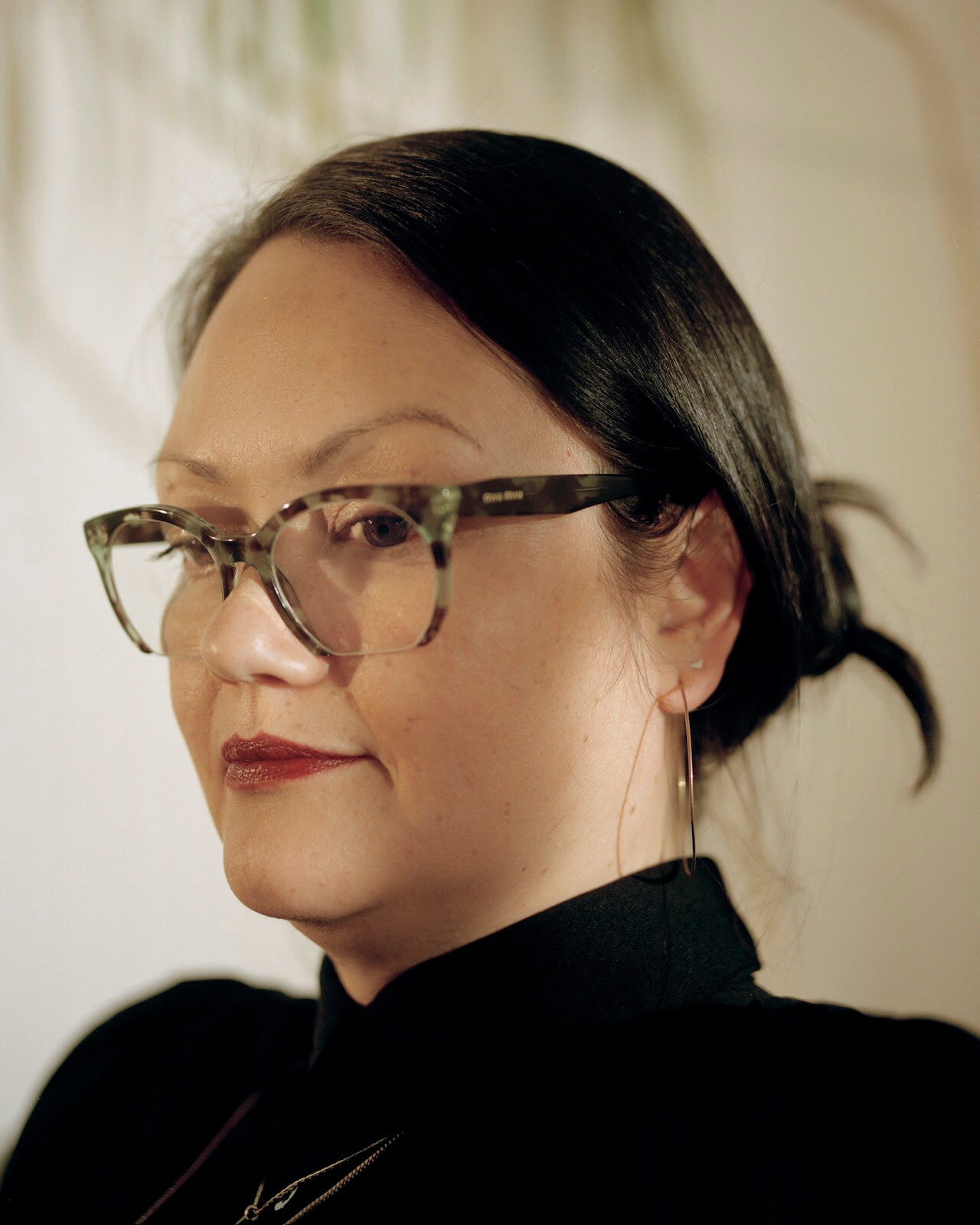
“Being an editor has also made me extra critical of my work, because I see amazing stuff everyday.”
MG: Do you think coming from a position as an editor makes your photography better? What do you think being an editor brings to your shooting?
SC: That’s a good question. It definitely gets me thinking more about the bigger picture and about stepping back. Sometimes, I wish I didn’t think about all these things you think of as an editor while I’m actually shooting and could just be in the zone. Being surrounded by photos and looking at images all day long, and thinking about how to tell stories definitely makes me a stronger shooter, but I don’t actually find the time to shoot very often, so as a result I feel rusty each time I pick up the camera, which sucks. Being an editor has also made me extra critical of my work, because I see amazing stuff everyday. So with my personal work, I often have that inner voice that it’s never good enough.
MG: We’re all like that. We’re all so vulnerable. Even as an editor, you’re very vulnerable. You’re putting the story out there for people to see and everyone is judging it and you hope somebody picks it up and talks about it. What a position to be in! Good stories and good imagery make the world go round, it’s what connects us.
SC: Yes, and as an editor, if I’m going to shoot something, it has to be extra good or else I should have commissioned someone else.
MG: Do you make work for yourself?
SC: I do, but I haven’t been doing it as much lately. I mean, I have a few million projects that I’d love to shoot. I have all these projects in a bucket, and I have a lot of long-term projects that I want to do over the course of 10 years. I admire the photographer-editor queens of the industry that can just do it all – like Caroline Tompkins and Elizabeth Renstrom. But I don’t have that same energy. It’s pretty easy to get buried in your work as an editor, but I miss it, and I should kick that bucket over and start shooting.
MG: It’s all about energy. Not to sound like an LA person, ha! But when it comes to energy, you only have so much of it and it’s not infinite. And you have to choose where you put it, and some things take more energy than others. Right now in my life, I’m living, breathing, eating, sleeping photography. Literally, when I’m not shooting, I’m reading blogs or looking at images or looking up technical stuff. I’m always looking at the latest equipment that’s come out. I’m learning more about lights and about how I can make my work better, or make my ideas stronger. And what little time I have left is for Sasha and for the dogs. So my social life sucks. I’m either shooting for myself, shooting for a job or hanging with Sasha. Nothing else! (laughs) I hardly go out anymore and I want to put every last bit of me into what I’m doing and make it the best I can and go as deep as I can with it. It’s taking all my energy and I’ve never really put all my energy into something like this before. And I think it explains why I’ve blossomed so quickly, it’s because I shifted gears and put everything I have into it. So much practice, hard work and intention.
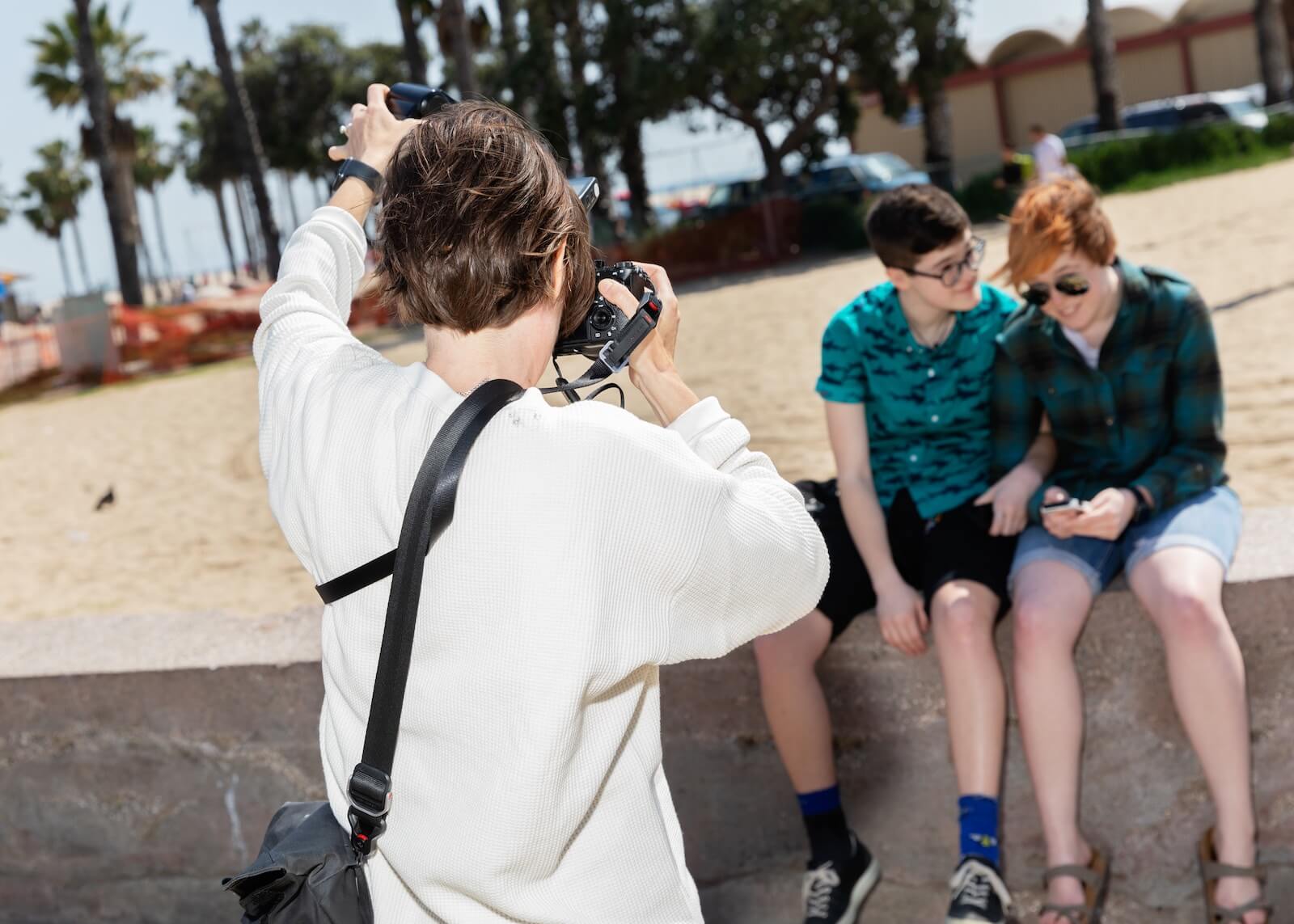
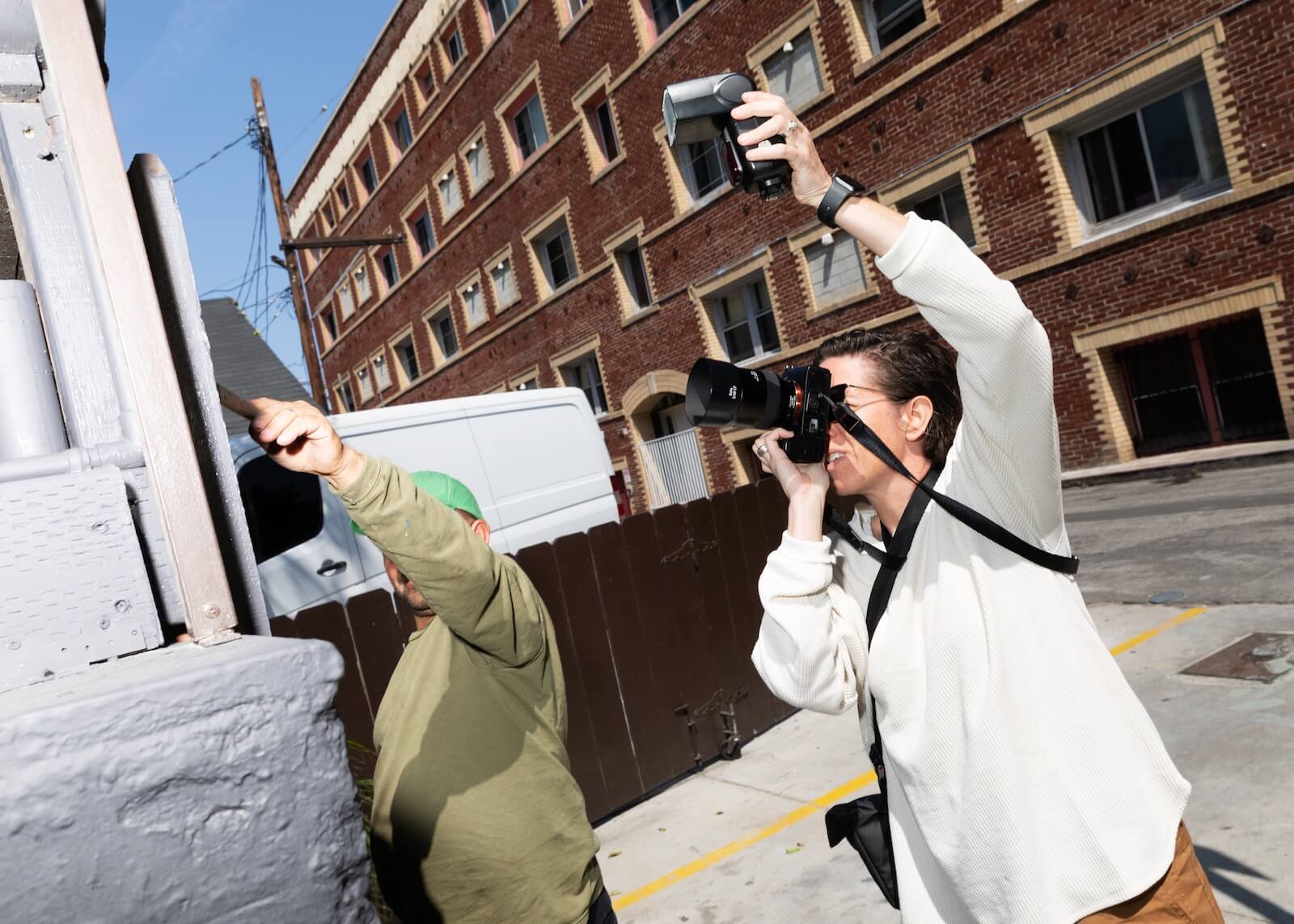
SC: And what about your photography family? Or your circle of friends, are they all photographers?
MG: Yes. I wish I had a closer group of friends, I used to have such a good social network in New York, I was out every night, I’d start my night at 12. I went out. I had really, really close friends. And I needed that. And then I got here, and I became pretty reclusive. I don’t feel like I have a lot of time for other people. And it took so much out of me just to get on my feet here but I’m sure eventually I’ll find more space and time for other people. But yes, all of the friends I have here are photographers and we talk about photography all the time. It’s horrible! (laughs)
SC: I love meeting all the photo families. The photo world is actually really small, and I love all the little pockets. And the photographer households are pretty awesome.
MG: Yes, it’s so hard to do it alone. I mean, Sasha’s my biggest cheerleader and I’m her biggest cheerleader. We both grew together in such a crazy way and that’s because we are so committed to each other’s success. We make so many sacrifices for each other and to make it work and we’re always there for each other, we share ideas. We talk about stuff. It’s just such big part of our relationship. I definitely don’t know where I’d be without her or if I was trying to do this on my own. I can’t even imagine. It would be very difficult emotionally. I feel lucky.
SC: Yes, that’s so important.
MG: I’m starting to think that in New York, everything was really exciting and turbulent and traumatic. And I got here and I feel like I just really stripped away all the craziness and it made my life really simple. And then my work became really clear. Very simple compositions and very clear messages. You know, I have my girlfriend, my home and my dogs. I have my routine and everything just got very quiet and that allowed me to focus on the work. You know? This is so weird to say but I feel like my work is so much cooler than I am.
SC: Ha!
MG: I’m not even kidding. I think when people see my work, they see edgy and colorful fashion stuff on the street and these cool stories and then they meet me and I look like someone’s mom or something. I’m such a nerdy person. When I go into meetings, people are like, “Oh, interesting.” Like they were expecting to meet with a really cool 25-year old. (laughs) But that’s alright. I really do feel like my best self when I’m shooting. I’m my own boss, I’m the most confident with a camera in my hand. And you know I can be quite shy and quiet and serious and nerdy when I’m not shooting. I wish I was more like photographer Michelle in my day-to-day life. This interview is starting to feel like an analyst’s couch! (laughs)
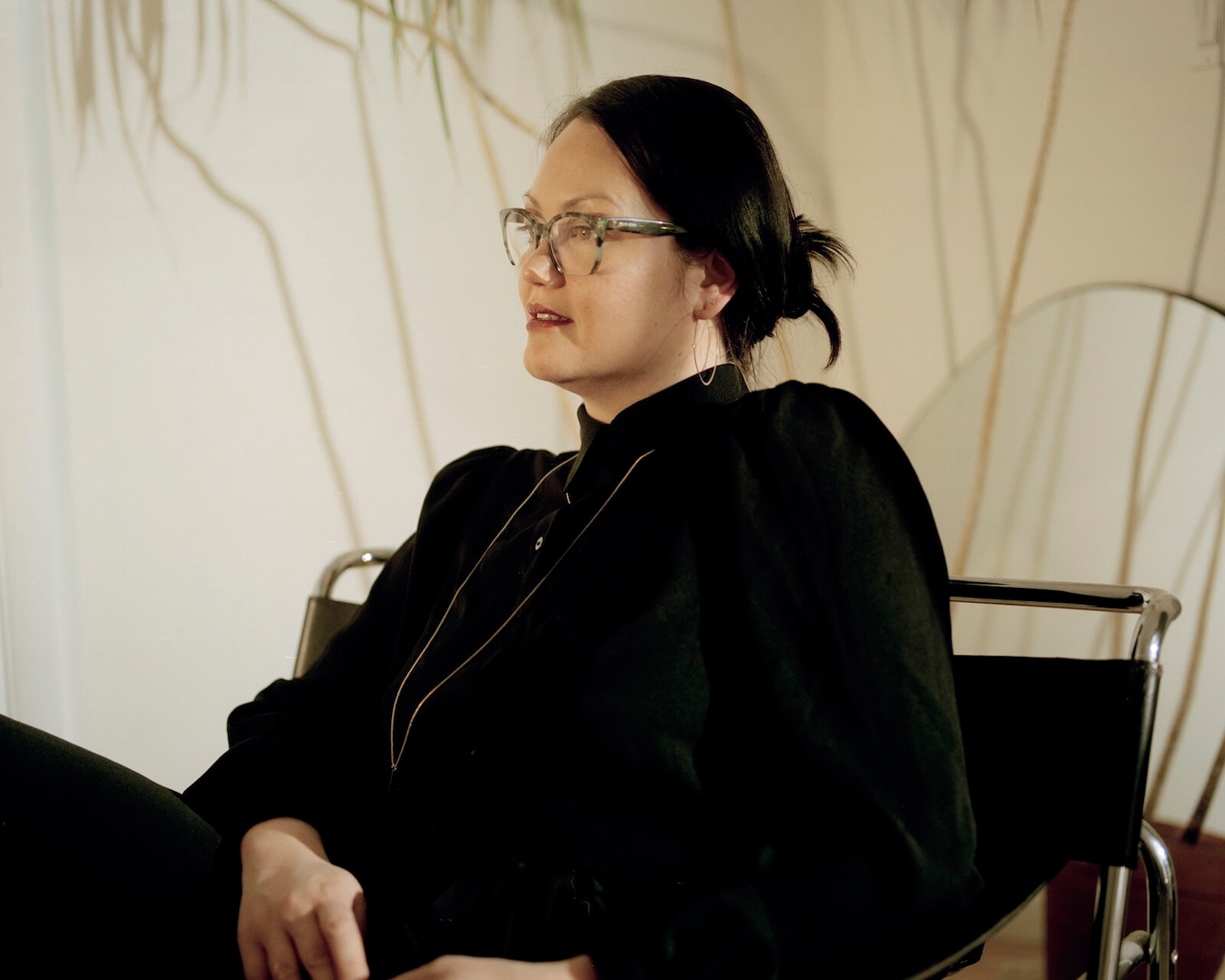
“The majority of women rarely ask for more. And almost all of the men will.”
MG: I think over the last two years, I’ve gotten a lot better at knowing my worth as a photographer.
SC: That’s so important.
MG: I just turned down a job that I would have accepted in the past but they practically expected me to put down my own money! I would have lost money on this gig. And even though the experience was cool, I had to say no. And I had to put down my foot, and say, “if you want me, you can’t pay me those rates”.
SC: I think about that, in regard to rates and whatnot. Something I’ve noticed, and it’s really sad – but it happens so often. Let’s say I’ve offered a rate to a woman, and she wasn’t able to to do the shoot. So I offer it to someone else, and I’ve noticed that 8 out of 10 times, the men will ask for more money. And I’m like, I’m not going to offer you more money unless you ask for it. People are so scared to ask for more money. I can understand that negotiating salaries can be intimidating. But at the same time, the worst thing that I might do is just say “Sorry, no, I can’t.” There might be times when I have more budget, where I can add a little bit more, or cover an assistant, equipment or whatever. But I would say the majority of women rarely ask for more. And almost all of the men will.
MG: I wish you would tell that to so many people!
SC: Oh I’m sure this will get me into trouble. (laughs) I mean, the photo world is so small so I try and keep everything super consistent. But there are definitely times when I think, why is (a woman photographer) not asking for more money? And then it gets to the point where sometimes I have to tell them “do you want an assistant?!” (laughs)
MG: I think there’s just a fear that the job might go away. I think when you’re starting out, you don’t know much, it’s scary, and you think that this job could help you, or that you want to get along with the editor… But it also hurts everybody when you start accepting really low rates. It hurts the whole industry. I keep thinking about the hay days, 20 years ago, when everybody was making 100 grand, and every photographer had a pool! (laughs)
SC: I mean, you said it. People need to know their worth. Every job is different, and sometimes there’s flexibility, and other times there’s a hard line, and I can’t offer more. And sadly there are times when I really don’t expect people to take the assignment. I know I might have commissioned them two months ago, and I might have offered them more for something similar, but you know, there was a different budget. It really varies. But for me, it never hurts to ask for more money. I can’t speak for every editor, and there might be some who don’t want to deal with you if you ask for more money every time, but I certainly wouldn’t be upset if you tried.
MG: Right, but to be fair it’s not always about the money. Sometimes, you get a great story, so interesting and fun that you just go for it. You should be able to pay your rent and bills, but there’s got to be something else other than just the money driving you. I’ve learned to turn down jobs if it’s too much trouble for too little money but if I get an amazing story, and I get to go somewhere really cool and the offer is decent, I’m willing to make that sacrifice because it’s really meaningful. It feels special to be able to do certain stories or meet people.This is such a cool job.
SC: For sure. I know people will sometimes take on the assignment because they feel like it’s a great story, and then they factor the hours and expenses involved and they realize they should have asked for more. It’s hard. It’s not a great part of the industry. It’s a hard position to be in.
MG: For sure. I mean, I’m trying to be more bold and my hope is that when you see my photos, you know what you’re getting. I hope that has some kind of cachet.
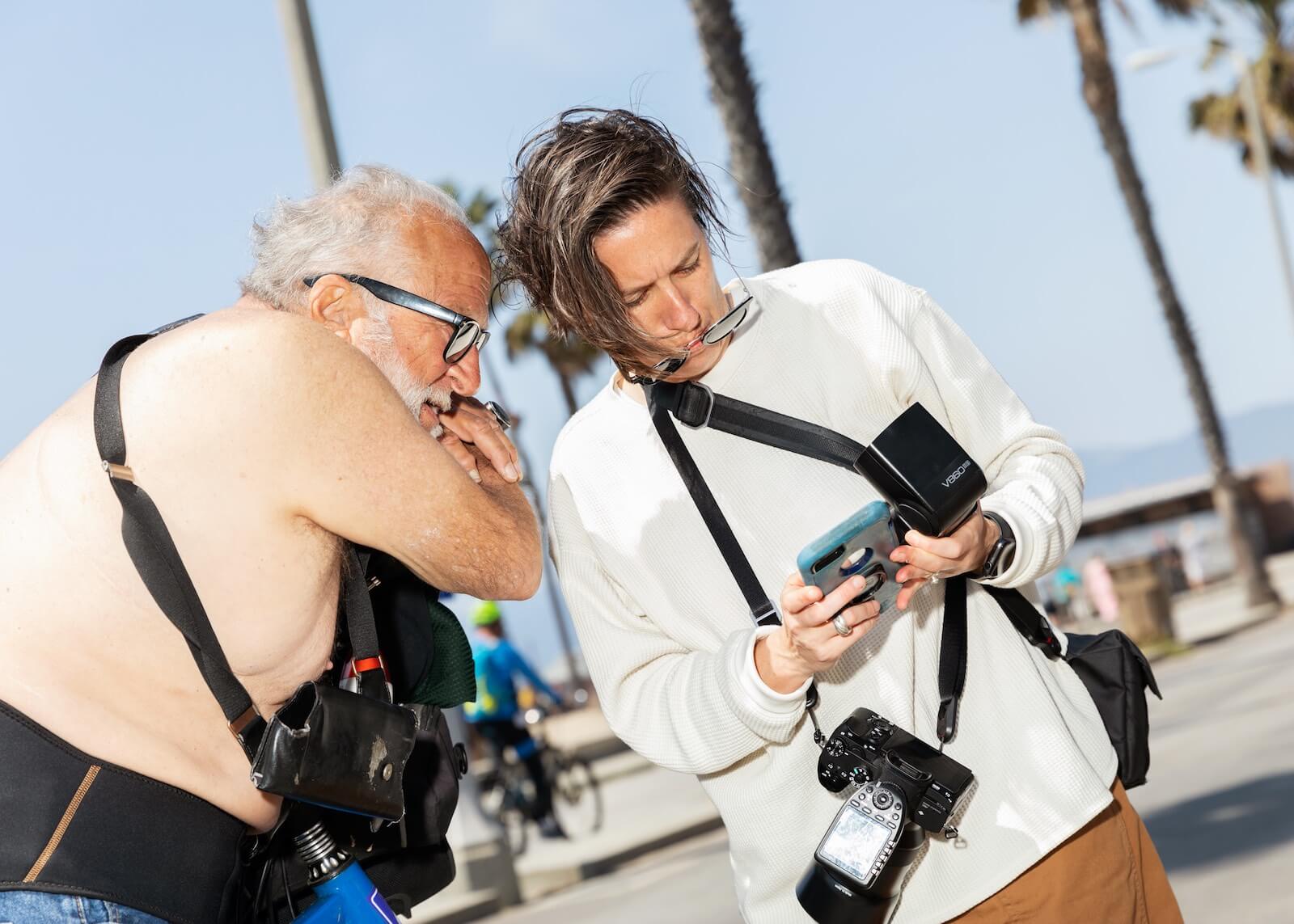
“Who knows if I’ll be pushed out? It’s very possible that at some point, people might want to go with someone younger.”
SC: Where do you see everything going from now on, in this industry? Do you see yourself working as a photographer forever?
MG: Hopefully! I hope that I keep going, that I keep getting better and stronger as a photographer. I can’t wait to be an old lady street photographer! I hope I’m still running around at 80. In terms of big goals, I do hope that my work ends up in a museum, somewhere. That would be a dream, although I know it’s a big one. That would be a very happy moment, because you know, I do consider myself more of an artist than a journalist. I think I bring my art to my journalism and I think my best work is my street work. To be picked up by a gallery would be amazing, too. I had a couple solo shows and they were amazing. To do more of that would be great. And more brand work, I think it would be a lot of fun to bring my street photography sensibility to working with brands. I’ve had a few good meetings lately, so hopefully that’ll happen. And somewhere down the road, I want to start a family with Sasha, before I get too old to pick a baby up. And that takes a lot of financial preparation, and commitment. And maybe being able to be a homeowner? I don’t know if that’ll ever be possible. But that’s a dream, to have a family and a home, and to be able to continue doing photography. That’s the dream. What about you?
SC: Down the line, I think I’ll always be doing photography, in some aspect. I’ve filled a lot of roles in the photo world. Whether it’s being an assistant, working freelance as a photographer, being an editor, a curator, a producer… And out of all of these, I love photo editing the most. I’m really happy where I am in my career and in my life. I wouldn’t really change anything, if I could. I mean, I’d love to have more energy and time to shoot – and executing more personal projects. That said, the way the industry is, especially in publications, in editorial, you really don’t know when something is going to fall. I primarily handle the web side of things, but no one is really safe. You never know what new platform or media is going to come out. And it is really exciting that there are so many opportunities and ways to create content that we didn’t have before. A lot of my photo experience has been working under tech companies, but I love what I do now so much more. But you know, all of this could explode, one day, right? (laughs)
MG: You’ll probably know in advance if anything explodes, since you work at Wired! (laughs)
SC: I’m the least technologically savvy person you’ll ever meet! I was the last person to get a mobile phone, I used pay phones until they were too nasty to use. And I was the last person to get on Facebook, and I probably wouldn’t use any of these things, minus Instagram, if it wasn’t for work. I’d miss Instagram, I love it. But I’m curious to see what is going to be the next platform, the next Instagram. Or will it all blow up? Will people revert back to printing? Who knows. I’ll hold on to this as long as I can, but when I was working at Instagram, I was definitely worried that I was going to age out of this very quickly. I was working on a team with a bunch of people in their twenties, and I loved it, but I was definitely the grandma of the group. (laughs) Who knows if I’ll be pushed out? It’s very possible that at some point, people might want to go with someone younger.
MG: It’s horrible to think about.
SC: There was a strong push toward teen content and interests, and I don’t have a teenager, I’m not hanging out with teens, so I was very far removed from that world. But you’re sitting there looking for content that’s exciting for teens.
MG: “What do the kids like?” (laughs)
SC: Ha, exactly! I mean, the demographic at Wired is very different, obviously. But my plan B is to open a bakery, or a little cafe with a photo gallery and bookstore component somewhere.
MG: Well, I hope you hire me to work there because being a barista is the only other thing I’m well trained in!
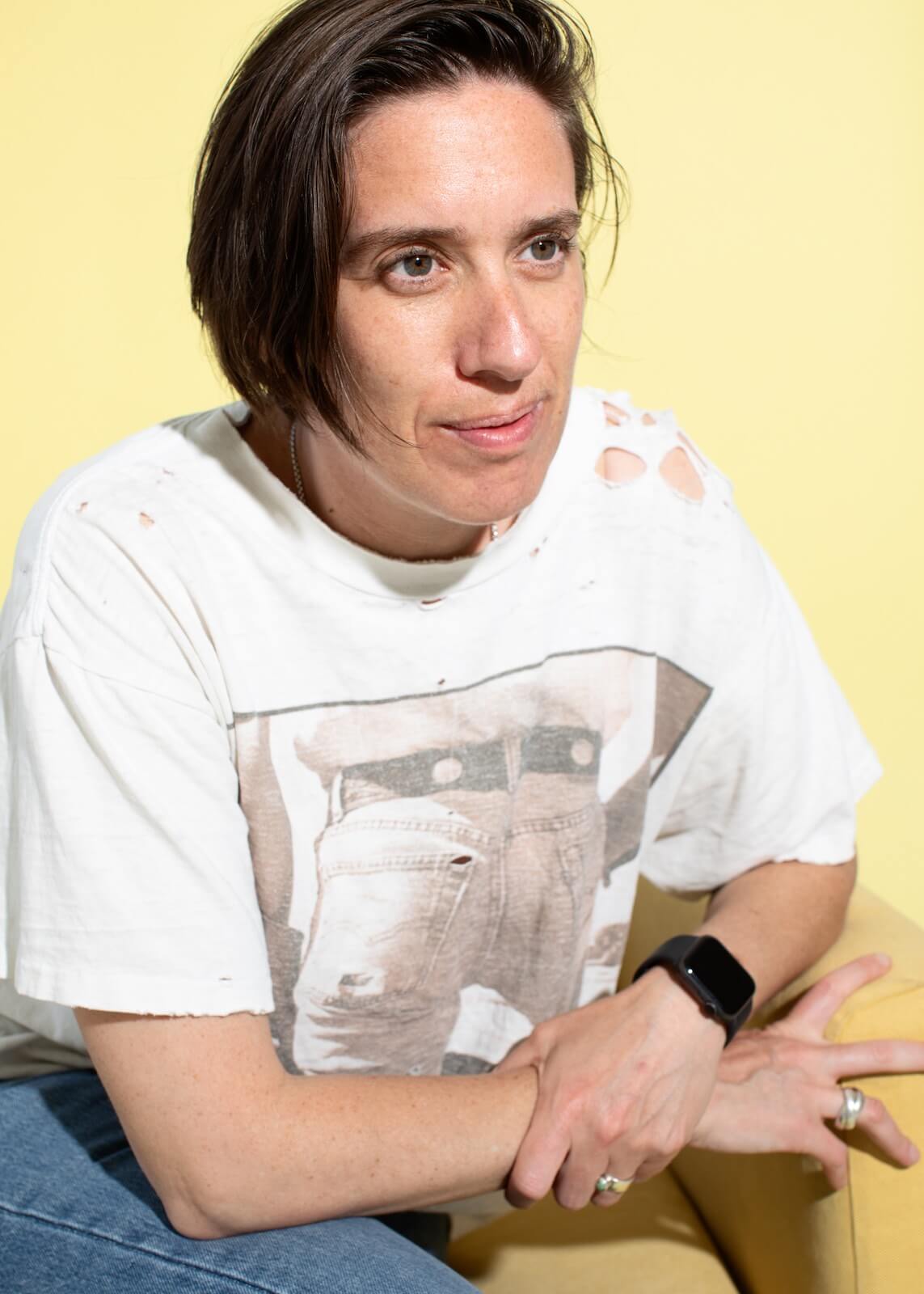
MG: I think people need to talk more openly about money, especially women. This is the first year I was able to buy a car. I bought one and it was such a big deal for me – I don’t even have a credit card.
SC: Oh my god, how do you not have a credit card?!
MG: I don’t know, I never did. I just don’t spend money that I don’t have.
SC: I put everything on my credit card. That way I don’t have to think about finances and can just reference the bill! (laughs) If it weren’t for my wife I would be living in a totally different fashion in regard to finances. I think a lot of people aren’t really guided in terms of saving money early. When I graduated college, I was working different jobs, I was waiting tables and doing freelance. I was making pretty good money bartending, but then I would just blow it all. If I had just saved a little bit of that money, I probably could have put a down payment on a house back then. Now, I’m thinking about my future, about retirement. What if this industry collapses? And it’s only going to become more difficult to find a job at my age. What will I be doing for work? I don’t know if I want to stay in the Bay Area. I’m not going to retire here.Who can afford to retire in the Bay Area? Even if your house is paid for, you have to be rich. And the reality is that I probably won’t be a photo editor when I’m 60 or 70 years old. Unless I start my own publication! (laughs) But I think about how I can reinvent myself to continue to make money. Will I be able to stay in the photo world? Considering my photo career was definitely not a straight line, even though I’m older, I’m not actually scared to reinvent myself. But photo editing is definitely by far my favorite part of the industry. The collaboration with the photographer, finding the photographer who can interpret or execute your vision, or the pleasure of handing a story over to a photographer without providing direction because you trust their work – this is magical. It feels like Christmas when a photographer sends you their images and you see what they did with the story.
MG: As a photographer, it’s so nerve-wracking when you send your work in! It’s so scary. And you’re waiting for the editor to tell you that you did a great job! It drives me insane when I don’t hear from the editor, and I get that you’re busy…
SC: I totally get that.
MG: And you’re sitting at home thinking “I fucked up! I did a terrible job!” (laughs) And Sasha tells me to calm down but I’m still never confident until I hear the editor finally tell me that I did a good job.
SC: Well, sometimes I download files at work because my wifi isn’t great at home, but I don’t look at them till the next morning…
MG: Oh my god! The worst! (laughs)
SC: I will always remember to follow-up immediately, now! Or at least, not to download them until I have time to email you right after! (laughs)
MG: I’m so glad we had this chat!
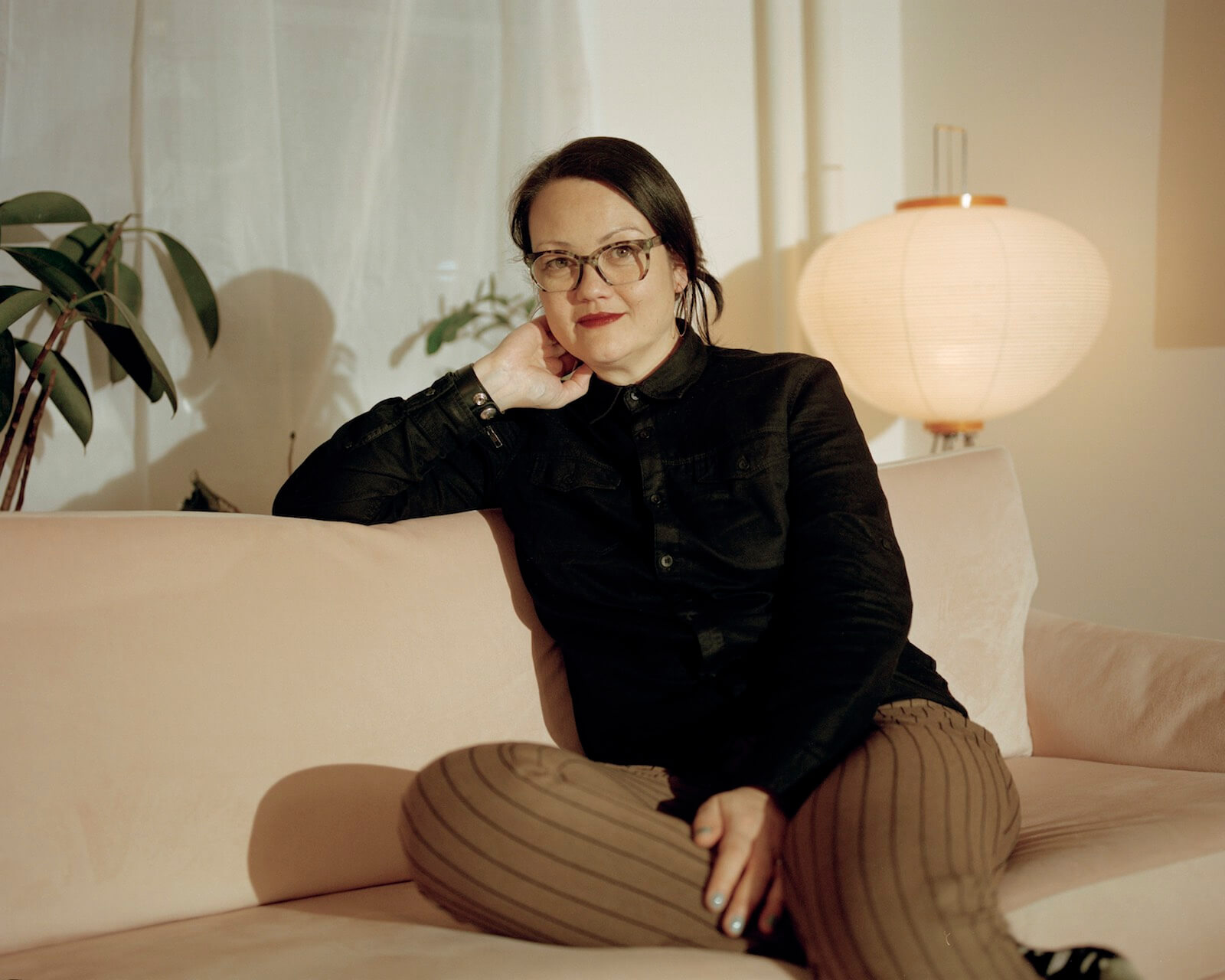
Rocket Science has been featuring the best in contemporary photography since 2016 through interviews, conversations, studio visits and essays by photographers, writers and artists. Your donation to Rocket Science directly supports new artistic content in the pages of Rocket Science and helps us pay our contributors fairly.
